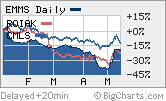|
Wall Street's ga-ga for radio
Shares of radio station owners have enjoyed a nice pop lately but analysts expect the rally to be short lived.
NEW YORK (CNNMoney.com) - Radio, what's new? Radio, someone still loves you. That's a line from "Radio Ga-Ga" by the rock band Queen. The song, about how radio was losing its prominence in the changing music world, was written 20 years ago.
But that lyric is still pretty relevant today ... especially when you look at how radio stocks have performed so far this month. It appears that Wall Street still loves radio. Shares of nine top radio stocks are up, on average, 9 percent during the past two weeks. So what's new? And more importantly for investors, can this momentum continue? Buyout talk is making waves...
Analysts say there are a couple of reasons radio stocks have enjoyed a bit of a rally. Earlier this month, industry leader Clear Channel Communications (Research) reported better-than-expected first quarter results and issued an upbeat advertising revenue forecast for the second quarter. Cox Radio (Research), another large radio station owner, also reported first quarter results that surpassed analysts' estimates. Another prominent radio firm, Emmis Communications (Research), said last week that its chief executive officer was looking to buy the remainder of the company that he didn't already own and take it private. Finally, Cumulus Media (Research) announced last week that it planned to repurchase up to 11.5 million of its Class A shares at a premium price. Analysts said that the fact that Emmis and Cumulus are showing that they see value in their stocks could limit the downside for the shares. "When you start to see CEOs drawing a line in the stand and saying valuations stop here, it gives some support to the stock," said Frederick Moran, an analyst with Stanford Group. But Moran thinks that the recent surge may only be temporary and that the stocks won't head that much higher. He said that this month's bounce is more of a relief rally; shares of the top industry companies are still down nearly 16 percent, on average, so far this year. Shares of radio operators are trading at depressed levels for good reason. Increased competition from satellite radio, Internet radio and the popularity of digital music players such as Apple's (Research) iPod has put a dent into the industry's audience...which in turn, has hurt ad sales. ...but slow growth may lead to more static
To that end, revenue growth is expected to be sluggish this year and next, with most of the top radio companies expected to post annual revenue increases in the low single digits. "There has not been a recovery in radio industry trends yet. Radio is still suffering from competitive pressures that will hurt sales and earnings growth," Moran said. As such, other analysts think that investors would be wise to steer clear of the group. David Bank, an analyst with RBC Capital Markets, said that it will get tougher for radio companies to post decent levels of earnings growth over the next few years due to rising expenses. He cites the increased costs of programming as well as money being spent on new initiatives such as high-definition (HD) digital radio as factors that will hurt the industry's profits. Bank said the spending may be necessary if the industry wants to hold on to listeners and attract new ones but that the costs come at a price. "Companies are doing different things with HD platforms and online radio and longer-term, many have the promise of diversifying out of the traditional radio business. But for the near to intermediate term, it's a drag on profits," he said. Still, what about the possibility for more consolidation? The Emmis announcement raises the possibility that other operators could make a bid for the firm. Analysts said Radio One (Research) has also gained ground lately on buyout speculation. James Goss, an analyst with Barrington Research, said more radio companies could decide to go private since most of the firms are still generating healthy amounts of cash, which could make them attractive to private-equity investors. Bank also thinks that more radio transactions are possible but that he doubts that any mergers will take place at a sizable premium to current prices. At the end of the day, the biggest problem radio companies will face is that they just aren't that sexy anymore. Sure, radio is not going to disappear. But analysts say there are plenty of other media companies that have brighter forecasts and they will probably continue to generate the most attention on Wall Street. "This is hardly a dying business but radio doesn't have the growth characteristics that some investors want. That's the bigger issue," said Goss. -----------------
Barrington's Goss owns shares of radio companies Clear Channel, Emmis and Entercom but his firm has no banking ties to the companies. Other analysts quoted in this piece do not own shares of the companies they cover and their firms have no banking ties to them. |
|


